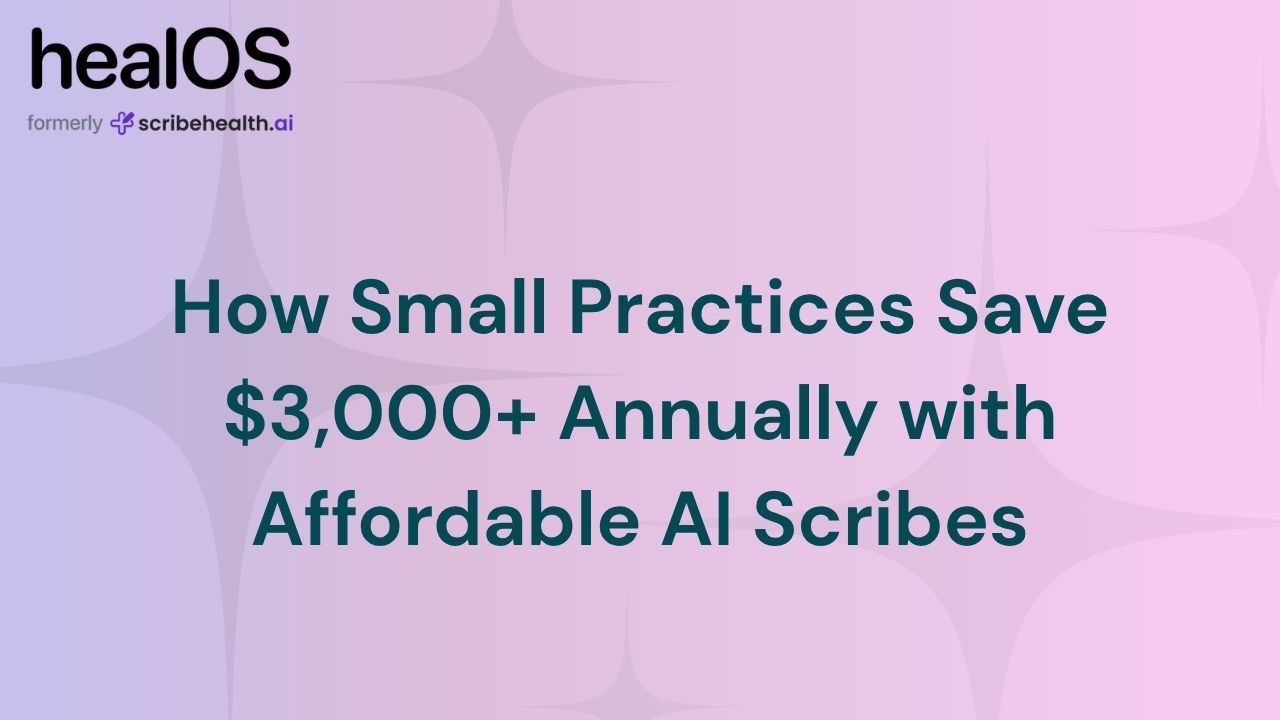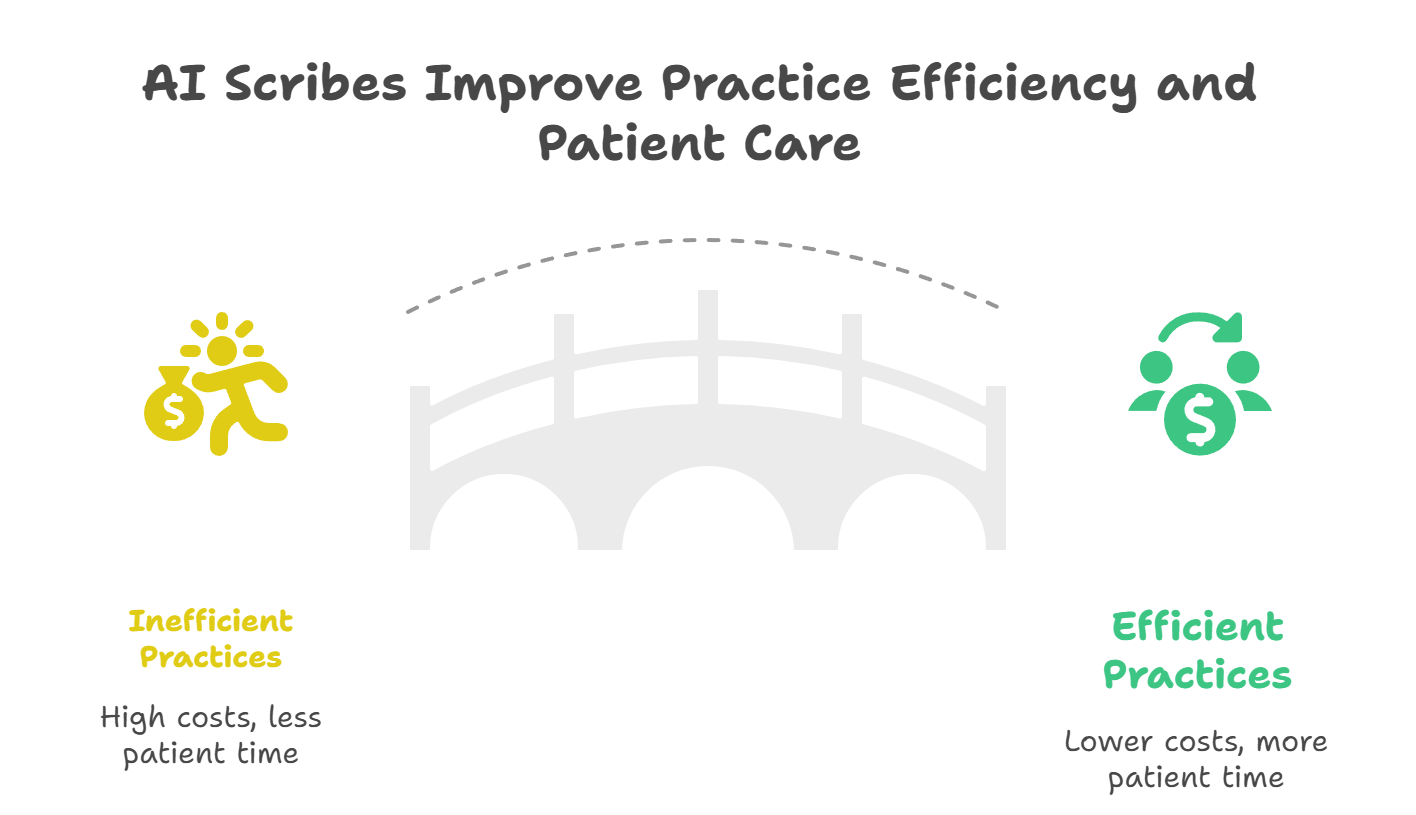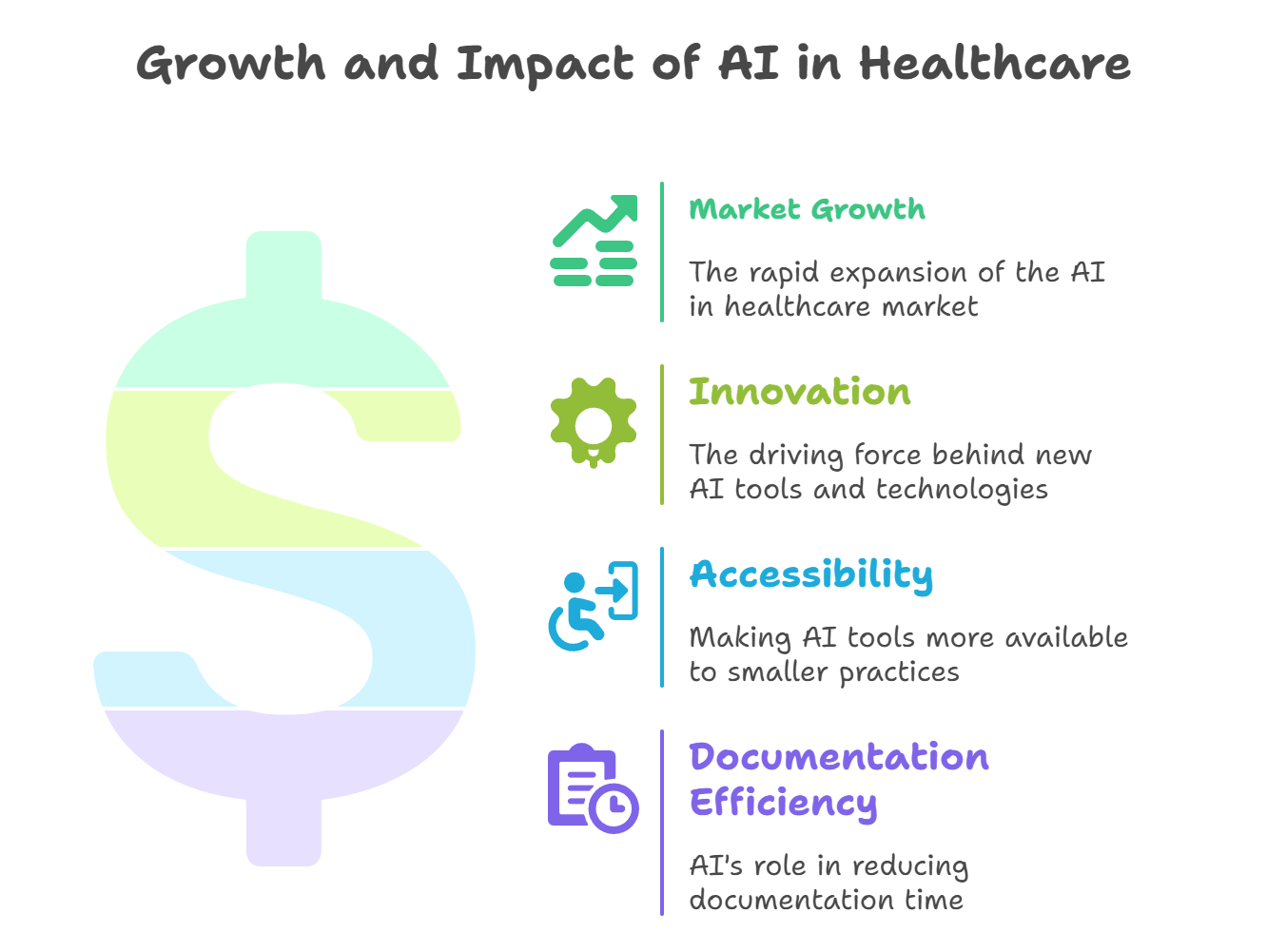How Small Practices Save $3,000+ Annually with Affordable AI Scribes
Small medical practices spend 40% of budgets on documentation costs while physicians work 1.84 hours daily on charts after hours. AI scribes like HealOS cost just $49 monthly versus $38,849 for human scribes, enabling practices to save $3,000 to $30,000+ annually while improving patient care and reducing burnout.

How Small Practices Save $3,000+ Annually with Affordable AI Scribes
Small medical practices spend nearly 40% of their operational budget on documentation costs. Yet most AI scribe solutions price themselves for large hospitals, not independent clinics. This creates a perfect storm where physicians spend 1.84 hours daily on documentation outside office hours, human medical scribes cost tens of thousands annually, and affordable alternatives seem out of reach. However, AI scribes like HealOS are changing this equation, enabling small practices to save $3,000 to $30,000+ annually while reclaiming precious time for patient care.

The Hidden Cost Crisis in Small Practice Documentation
Small practices face a perfect storm of rising documentation costs, physician burnout, and shrinking profit margins that threaten their very survival.
Direct Financial Burden
The numbers tell a stark story about medical documentation costs. Human medical scribes earn an average salary of $38,849 annually, but that's just the beginning. Small practices must also budget for training costs, which typically run $2,000 to $5,000 per replacement when scribes leave.
Benefits and overhead add another 20% to 30% on top of base salaries. This means the true cost of a human medical scribe often exceeds $45,000 per year for a single provider. For a three-provider practice, documentation costs alone can consume over $135,000 annually.
These direct expenses create immediate budget pressure. Many small practices operate on thin margins, making it difficult to absorb such significant documentation costs while maintaining competitive patient care.
Hidden Operational Costs
Beyond the obvious expenses, documentation creates hidden costs that drain practice resources. Physician burnout affects 48.2% of doctors, partly due to excessive administrative work. This burnout contributes to medical scribe turnover rates of 25% to 35% annually.
Lost revenue represents another major hidden cost. When physicians spend hours on documentation, they see fewer patients. At an average of $200 per visit, losing just two patients daily costs a practice $104,000 in annual revenue. This doesn't include the opportunity cost of after-hours documentation work.
The ripple effects extend to job satisfaction and work-life balance. When doctors spend evenings completing charts instead of resting, it affects their performance the next day. This cycle perpetuates the documentation burden and contributes to practice inefficiencies.
AI Scribes: The Great Equalizer for Small Practices
Artificial intelligence is democratizing advanced healthcare technology, giving small practices access to enterprise-grade solutions at affordable prices.
The Technology Revolution
The healthcare AI market is experiencing explosive growth. Industry experts project the global AI in healthcare market will reach $187.69 billion by 2030, growing from $26.57 billion in 2024. This rapid expansion is driving innovation and making AI tools more accessible to smaller practices.
Real-world results prove AI's effectiveness in healthcare documentation. The Permanente Medical Group saved 15,791 hours of documentation time in one year using AI scribes. That's equivalent to 1,794 eight-hour workdays returned to physicians for patient care.
For small practices, this technology revolution levels the playing field. Where once only large health systems could afford advanced documentation solutions, AI now makes these tools available at a fraction of traditional costs.

Quantifying the AI Advantage
AI medical scribes deliver measurable benefits that transform practice operations. Most practices see 60% to 75% cost reductions compared to human scribes. This dramatic savings comes from eliminating salary, benefits, training, and turnover costs associated with human staff.
Time savings provide equally impressive results. Physicians typically save 2 to 3 hours daily on documentation tasks when using AI scribes. This reclaimed time allows doctors to see 15% to 25% more patients, directly increasing practice revenue.
The financial impact extends beyond cost savings. Physician burnout costs the U.S. healthcare system $4.6 billion annually due to turnover and reduced work hours. AI scribes help address this crisis by reducing administrative burden and improving work-life balance for physicians.
HealOS (formerly HealOS (formerly Scribehealth.ai)) vs Competitors: Transparent Cost Comparison
While most AI scribe solutions target enterprise clients with premium pricing, HealOS delivers comprehensive features at small-practice-friendly rates.
Market Pricing Analysis
The AI medical scribe market shows dramatic price variations that often exclude small practices. Premium solutions like DeepScribe charge $300 to $500 monthly per provider. Nuance DAX costs $369 to $399 monthly. Even mid-tier options like Freed AI and Heidi Health both charge $99 monthly per provider.
HealOS breaks this pricing pattern at just $49 per provider monthly. This represents nearly 50% savings compared to similar competitors. For a three-provider practice, the annual difference between HealOS and Freed AI alone amounts to $1,800 in savings.
The pricing advantage becomes even more dramatic when compared to human scribes. While a human medical scribe costs $2,800 to $3,500 monthly including benefits, HealOS provides superior consistency and availability for under $50 monthly.
Feature-to-Cost Value Proposition
HealOS delivers enterprise-grade features without enterprise pricing. The platform includes bidirectional EHR integration with 35+ systems, unlike competitors that offer only one-way sync. Built-in medical coding assistance reduces billing errors and increases revenue capture through accurate CPT code generation.
The comprehensive template library includes SOAP and DAP formats plus 50+ custom options for specialty-specific documentation. Session analytics provide continuous improvement insights, while HIPAA compliance ensures security with military-grade encryption.
Most importantly, HealOS requires no setup fees and offers flexible month-to-month contracts. This eliminates the financial risk that often prevents small practices from trying new technology solutions.
Real ROI: Breaking Down the $3,000+ Annual Savings
The math is compelling - even the smallest practices can achieve substantial returns by switching from human scribes to AI solutions.
Single Provider Practice Savings
A solo physician practice using a human medical scribe faces annual costs of approximately $38,849 in salary alone. Adding benefits, training, and overhead expenses pushes the total to roughly $45,000 annually. HealOS costs just $588 per year for unlimited usage.
This creates net annual savings of over $44,000 for a single provider. The return on investment exceeds 7,500%, making AI scribes one of the highest-ROI investments available to healthcare practices. Even accounting for implementation time and learning curves, practices typically see payback within the first month.
The minimum $3,000 savings mentioned in our title represents the most conservative scenario. Even if human scribe costs were just $4,000 annually (far below market rates), switching to HealOS would still save over $3,400 yearly.
Multi-Provider Practice Scaling
Savings multiply dramatically for larger small practices. A three-provider clinic using human scribes faces annual documentation costs exceeding $135,000. With HealOS at $1,764 annually, net savings approach $133,000 yearly.
Five-provider practices see even greater impact. Human scribe costs of approximately $225,000 annually drop to $2,940 with HealOS, creating savings of over $222,000. These figures explain how some small practices achieve $30,000+ annual savings referenced in our introduction.
The scaling effect makes AI scribes increasingly attractive as practices grow. Unlike human staff, AI solutions don't require additional office space, equipment, or management overhead as provider counts increase.
Revenue Enhancement Beyond Cost Savings
AI scribes enable revenue growth that amplifies the savings impact. Physicians using AI documentation tools typically see 15% to 25% more patients by reclaiming documentation time. For a practice averaging $200 per visit, just two additional patients daily generates $104,000 in extra annual revenue.
Improved coding accuracy provides another revenue stream. AI scribes help capture previously missed billing opportunities and reduce claim denials. Many practices report 10% to 15% increases in properly coded procedures after implementing AI documentation.
The combination of cost savings and revenue enhancement creates compound benefits. A practice saving $44,000 annually while generating $104,000 in additional revenue achieves a total annual improvement approaching $150,000.
Case Study: Mountain View Family Practice's Transformation
See how a real three-provider clinic achieved measurable results within six months of implementing HealOS.
The Challenge
Mountain View Family Practice struggled with typical small practice documentation problems. Dr. Sarah Chen and her two partners spent 3 to 4 hours nightly completing charts after seeing patients all day. This after-hours work led to exhaustion and serious consideration of practice closure.
The practice initially tried Freed AI at $99 per provider monthly. However, the limited features proved insufficient for their complex workflows. The annual cost of $3,564 strained their technology budget without delivering expected results.
Documentation backlogs continued growing despite the AI investment. Provider burnout increased, and patient satisfaction scores declined as rushed appointments became the norm.
The HealOS Solution
HealOS offered comprehensive features at $49 per provider monthly, immediately reducing annual AI costs from $3,564 to $1,764. This $1,800 savings provided breathing room for other practice improvements.
More importantly, the built-in coding assistance and advanced analytics provided additional value that Freed AI couldn't match. The bidirectional EHR integration streamlined workflows in ways the previous solution couldn't achieve.
Implementation took less than one week, compared to the months required for their previous attempt. The 1:1 onboarding support ensured successful adoption across all three providers.
Measurable Results After 6 Months
The practice achieved multiple measurable improvements within six months. Chart completion time decreased by 25%, eliminating most after-hours documentation work. Claims processing accelerated by 2 days on average, improving cash flow.
Coding accuracy improvements generated an additional $12,000 in properly captured revenue during the first six months. The 15% increase in properly coded procedures more than paid for the entire annual HealOS cost.
Dr. Chen summarized the impact: "HealOS delivered over $13,800 in measurable value during our first six months. The combination of cost savings and revenue enhancement made this the best investment we've ever made in our practice."
Implementation Made Simple: Getting Started with HealOS
Unlike complex enterprise solutions requiring months of setup, HealOS offers immediate deployment with comprehensive support.
5-Step Implementation Process
HealOS's implementation process prioritizes simplicity and speed. First, practices start with 20 free sessions to test functionality without financial commitment. This risk-free trial allows thorough evaluation of the platform's capabilities.
Second, EHR integration connects with existing systems in minutes rather than weeks. It supports 35+ major EHR platforms including Practice Fusion, DrChrono, Athena, eClinicalWorks, NextGen, and Tebra.
Third, template customization configures SOAP, DAP, or specialty-specific formats to match practice workflows. Fourth, minimal staff training introduces the intuitive interface to providers and support staff. Finally, practices go live immediately and begin saving time and money.
Support and Training Infrastructure
It provides comprehensive support throughout implementation and beyond. 1:1 onboarding sessions ensure successful setup for each provider. These personalized sessions address specific practice needs and workflow preferences.
24/7 customer support provides ongoing assistance whenever questions arise. Regular training webinars introduce advanced features and optimization techniques. Larger practices receive dedicated success managers to maximize their investment.
This support infrastructure differentiates HealOS from competitors that provide minimal implementation assistance. The comprehensive approach ensures practices achieve maximum benefits from their AI investment.
Addressing Common Concerns: FAQ for Small Practices
Small practice owners often have specific questions about AI implementation costs, security, and practical benefits.
Cost and Value Questions
"How much does an AI medical scribe cost?" varies dramatically across providers. Budget-conscious practices can start with HealOS at $49 monthly, while premium solutions exceed $500 monthly. The key is matching features to practice needs rather than paying for unused capabilities.
"How much does AI save compared to human scribes?" depends on current costs, but most practices save 60% to 75%. A practice spending $45,000 annually on human scribes typically reduces costs to under $600 with HealOS, creating savings exceeding $44,000 yearly.
Return on investment timelines are remarkably short for AI scribes. Most practices achieve payback within 30 days due to immediate cost reductions and workflow improvements. The ongoing savings continue indefinitely, making AI scribes among the highest-ROI healthcare investments.
Practical Implementation Questions
Security concerns are addressed through HIPAA compliance and military-grade encryption. HealOS meets all healthcare data protection requirements while providing audit trails for compliance documentation.
Integration with existing workflows requires minimal disruption. Most practices adapt to AI scribes within one to two weeks. The learning curve is gentler than implementing new EHR systems or hiring human staff.
Staff training requirements are minimal due to intuitive interfaces. Most providers become proficient with AI scribes faster than they would training human scribes on practice-specific procedures.
The Future of Small Practice Documentation
Early AI adoption provides competitive advantages that will become essential for practice sustainability and growth.
Industry Transformation Trends
Healthcare AI adoption is accelerating rapidly. 80% of hospitals now use AI for operational efficiency, and small practices are following suit. Early adopters gain competitive advantages through cost leadership, enhanced patient satisfaction, and improved provider retention.
Market positioning benefits extend beyond immediate cost savings. Practices using AI documentation can offer more competitive pricing while maintaining higher profit margins. This advantage becomes crucial as healthcare markets become increasingly price-sensitive.
The competitive landscape will increasingly favor AI-enabled practices. As technology adoption spreads, practices without AI tools will struggle to match the efficiency and cost structure of their competitors.
HealOS's Innovation Roadmap
HealOS continues innovating specifically for small practice needs. Advanced analytics for practice optimization will provide deeper insights into workflow efficiency and revenue opportunities.
Specialty-specific modules will address unique documentation requirements for different medical specialties. Patient engagement tools will enhance communication and satisfaction scores. Revenue cycle enhancements will further improve billing accuracy and collections.
This continued innovation ensures HealOS users stay ahead of industry trends while maximizing their technology investment over time.
Take Action: Start Saving Today
The question isn't whether small practices can afford AI scribes - it's whether they can afford not to implement them.
Small practices no longer need to choose between advanced technology and budget constraints. HealOS proves that enterprise-grade AI scribes can be both powerful and affordable, delivering $3,000 to $30,000+ in annual savings while improving patient care and provider satisfaction. With no upfront costs, flexible contracts, and immediate implementation, there's no reason to delay this practice-changing investment. The combination of dramatic cost savings, revenue enhancement, and improved work-life balance makes AI scribes essential for modern healthcare practice success.
.png)
